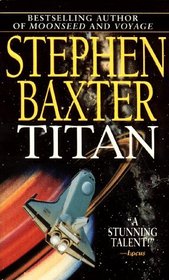Helpful Score: 3
Baxter is such a versatile SF writer that even his "hard" science fiction can vary widely from book to book. It's hard to imagine such a mind that can envision personalities, situations and universes with the scope of his prose.
Titan falls within a category of Sci Fi that is near and dear to my heart: that which is almost, but not quite, possible in our present time. The book focuses upon a small group of people who do not wish to abandon the manned space exploration dream even when popular opinion and bureaucratic judgment make such an act mandatory.
Using abandoned technology and materiel, this group dedicates the rest of their lives to fulfill what they see as an ultimate dream and potentially the spark which can fan the flame of public opinion back to the drive to explore the universe.
The book Titan explores this journey to Titan itself - Saturn's moon which has, in real life, been photographed and briefly touched by man's exploratory machines. One of Baxter's strengths is the ability to envision the way human beings interact with each other and their environment. We are able to deeply identify with the characters are they go through the difficulties of a long journey in a small space, with the usual daily minutae which, in space, can become life-threatening dangers. Once arrived at their destination, they must survive landing and prepare their limited habitat for an extended stay.
Baxter forms characters which are full fleshed enough to make random accidents and temper flare ups quite believeable. Only toward the end does he slip into more esoteric, far-future fantasy - yet what I call "fantasy" has nothing to do with elves and telepathy: this is the strangely dreamy universe created by scientifically genuine chemistry, physics and space.
Titan falls within a category of Sci Fi that is near and dear to my heart: that which is almost, but not quite, possible in our present time. The book focuses upon a small group of people who do not wish to abandon the manned space exploration dream even when popular opinion and bureaucratic judgment make such an act mandatory.
Using abandoned technology and materiel, this group dedicates the rest of their lives to fulfill what they see as an ultimate dream and potentially the spark which can fan the flame of public opinion back to the drive to explore the universe.
The book Titan explores this journey to Titan itself - Saturn's moon which has, in real life, been photographed and briefly touched by man's exploratory machines. One of Baxter's strengths is the ability to envision the way human beings interact with each other and their environment. We are able to deeply identify with the characters are they go through the difficulties of a long journey in a small space, with the usual daily minutae which, in space, can become life-threatening dangers. Once arrived at their destination, they must survive landing and prepare their limited habitat for an extended stay.
Baxter forms characters which are full fleshed enough to make random accidents and temper flare ups quite believeable. Only toward the end does he slip into more esoteric, far-future fantasy - yet what I call "fantasy" has nothing to do with elves and telepathy: this is the strangely dreamy universe created by scientifically genuine chemistry, physics and space.
Helpful Score: 2
Hard SF from a solid writer.
Helpful Score: 1
I really like Titan. It's uplifting in a downbeat way. The science part is good and hard, realistic as it gets. The political side pushes too hard. I'm not at all fond of religious fanatics, but even I found that part of the book hard to swallow. Luckily, it doesn't really impact the science side.
The ending is, well, out there a bit. I've read some reviews that really hated the ending, but I didn't really find it troubling. But nor did it really give me closure. I think the book would have been fine without it.
The ending is, well, out there a bit. I've read some reviews that really hated the ending, but I didn't really find it troubling. But nor did it really give me closure. I think the book would have been fine without it.




